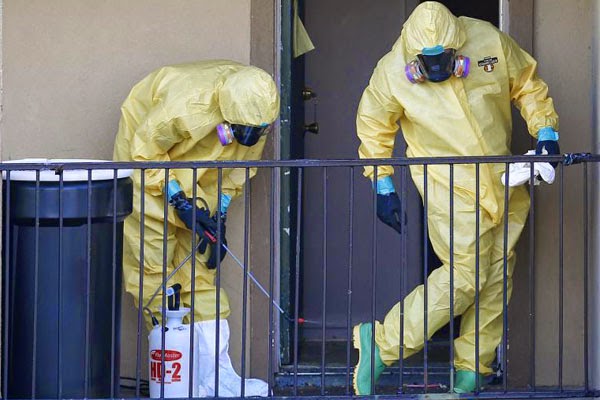Health concerns ringing alarm across Spain and United States of America after a Spanish nurse was found positive for Ebola Virus disease. On Monday, Spain’s health minister said that a Spanish nurse is under surveillance after a Madrid hospital has tested positive for Ebola virus. This Spanish nurse was part of the medical team that treated priests Miguel Pajares, who died on Aug 12 and Manuel Garcia Viejo, who died on Sep 26 at the hospital Carlos III de Madrid.
After an emergency meeting held on Monday afternoon in Madrid, Health Minister of Spain, Ms Ana Mato said that the Ebola infection was confirmed by two separate tests. According a Spanish news paper, El pais, the woman checked herself on Monday morning in a hospital in Alcorcon, a city in southwest of Madrid, with a high fever. The woman is aged about 44 years and has no children is taken into quarantine. Health officials quoted that there other 30 people are currently going under medical checkup but nobody is confirmed positive except the woman.
Woman went on a vacation after Garcia Viejo’s death, but did not disclose the destination. She led a normal life in recent weeks and her only symptoms were a fever and fatigue, Antonio Alemany, Madrid director of primary health care, said in the news conference. He said, "We do not know yet what could have failed, we are investigating the mechanism of infection".
The World Health Organization confirmed there has not been a previous transmission outside West Africa in the current outbreak. WHO spokeswoman Fadela Chaib told The Associated Press that so far there have only been confirmed cases in West Africa and the United States, and no known transmission outside West Africa. The organization is awaiting official notification of the case from Spanish authorities. The woman will be transferred for treatment to Madrid's Carlos III hospital, where she has been a nurse for 15 years.
The virus that causes Ebola spreads only through direct contact with the bodily fluids of an infected person who is showing symptoms. Spanish authorities said they were investigating how the nurse became infected at a hospital with modern health care facilities and special equipment for handling cases of deadly viruses.
More than 370 health workers in West Africa have become infected in this outbreak, and more than half of those have died. Doctors and nurses there have worked under difficult conditions, treating patients in overflowing wards, sometimes without proper protection. But even under ideal conditions, experts warn that caring for Ebola patients always involves a risk.
Ebola screenings for airline passengers in US and Africa
President Obama said Monday the U.S. government would increase passenger screenings in the United States and Africa to detect the Ebola virus, even as he resisted calls to impose a ban on those traveling from the three countries most affected by the outbreak.
Neither the president nor White House officials elaborated on exactly what those new screenings would entail. At the moment, passengers leaving the three nations most affected by the virus — Liberia, Guinea and Sierra Leone — are screened for symptoms at the airport before departing.
“The ability of people who are infected who could carry that across borders is something that we have to take extremely seriously,” Obama said Monday afternoon after a meeting with top advisers to discuss Ebola.
About Ebola Virus
Ebola virus disease (EVD), formerly known as Ebola haemorrhagic fever, is a severe, often fatal illness in humans. The virus is transmitted to people from wild animals and spreads in the human population through human-to-human transmission. The first EVD outbreaks occurred in remote villages in Central Africa, near tropical rainforests, but the most recent outbreak in west Africa has involved major urban as well as rural areas.
The Ebola virus causes an acute, serious illness which is often fatal if untreated. Ebola virus disease (EVD) first appeared in 1976 in 2 simultaneous outbreaks, one in Nzara, Sudan, and the other in Yambuku, Democratic Republic of Congo. The latter occurred in a village near the Ebola River, from which the disease takes its name.
There have been more cases and deaths in this outbreak than all others combined. It has also spread between countries starting in Guinea then spreading across land borders to Sierra Leone and Liberia, by air (1 traveller only) to Nigeria, and by land (1 traveller) to Senegal.
Ebola Transmission
It is thought that fruit bats of the Pteropodidae family are natural Ebola virus hosts. Ebola is introduced into the human population through close contact with the blood, secretions, organs or other bodily fluids of infected animals such as chimpanzees, gorillas, fruit bats, monkeys, forest antelope and porcupines found ill or dead or in the rainforest.
Ebola then spreads through human-to-human transmission via direct contact (through broken skin or mucous membranes) with the blood, secretions, organs or other bodily fluids of infected people, and with surfaces and materials (e.g. bedding, clothing) contaminated with these fluids.
Symptoms of Ebola Virus Disease
The incubation period, that is, the time interval from infection with the virus to onset of symptoms is 2 to 21 days. Humans are not infectious until they develop symptoms. First symptoms are the sudden onset of fever fatigue, muscle pain, headache and sore throat. This is followed by vomiting, diarrhoea, rash, symptoms of impaired kidney and liver function, and in some cases, both internal and external bleeding (e.g. oozing from the gums, blood in the stools). Laboratory findings include low white blood cell and platelet counts and elevated liver enzymes.



0 comments:
Post a Comment